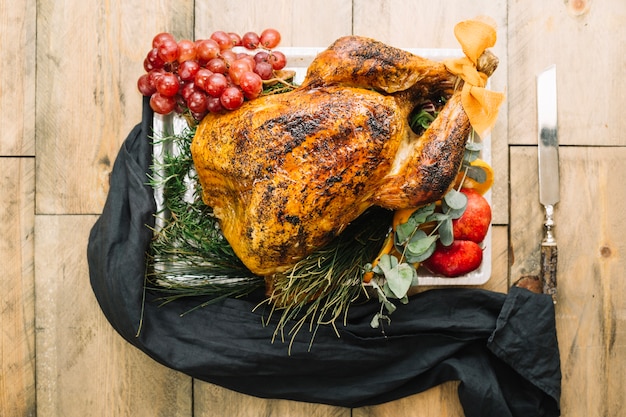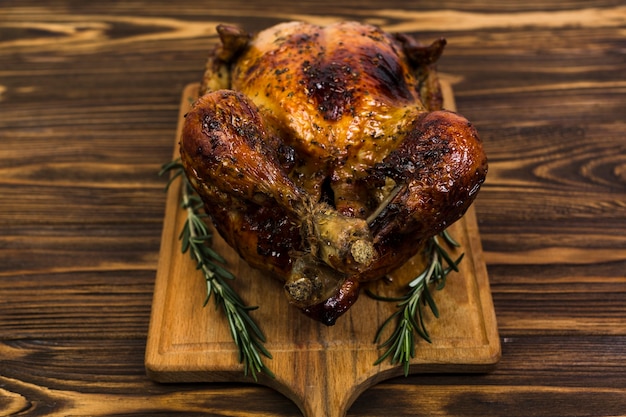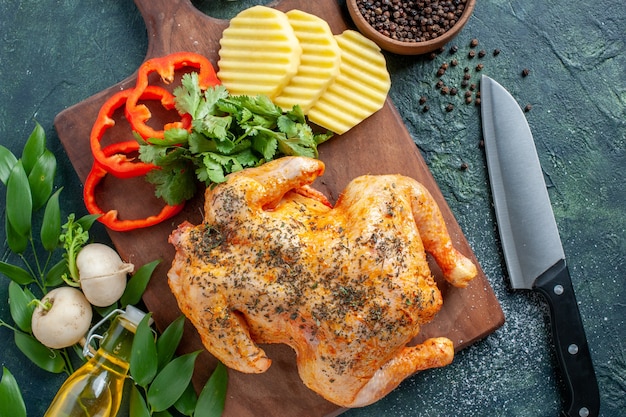What is the best way to cook chicken so it doesn’t dry out?
Chicken is a versatile and popular protein choice for many households across the United Kingdom. However, one common concern when cooking chicken is how to avoid it becoming dry and flavorless. Dry chicken can be disappointing and make even the best recipes fall short of expectations. To ensure your chicken remains juicy and tender, there are several key techniques and cooking methods that you can employ.
1. Choose the right cut of chicken
The first step towards preventing dry chicken is to select the right cut. Different parts of the chicken have varying levels of fat content, with dark meat generally being more moist than white meat. Consider using bone-in, skin-on chicken pieces as they retain more moisture during cooking. The bones help to insulate the meat while the skin acts as a protective barrier, keeping the chicken moist.
2. Brine the chicken
Brining is an excellent technique to enhance the juiciness and flavor of chicken. Brining involves soaking the chicken in a solution of salt and water for a period of time before cooking. The salt helps the chicken retain moisture, resulting in a juicier final product. You can add additional seasonings and aromatics to the brine, such as herbs, spices, or citrus zest, to infuse extra flavors into the meat.
3. Use proper cooking temperatures and times
Cooking chicken to the correct internal temperature is crucial in preventing dryness. Overcooking chicken can lead to dry and tough meat. Use a meat thermometer to ensure the chicken reaches the recommended safe minimum internal temperature of 75°C (165°F) for all parts of the bird. Cooking times may vary depending on the cut and method used, so it’s important to consult a reliable cooking guide or recipe.
4. Employ moist cooking methods
Choosing the right cooking method can significantly impact the moisture level of your chicken. Moist cooking methods, such as roasting, braising, or slow cooking, help lock in the juices and keep the meat tender. These methods typically involve cooking the chicken in liquid or with added moisture, preventing excessive evaporation and resulting in a moist final product.
5. Let the chicken rest
Allowing the cooked chicken to rest for a few minutes before slicing or serving is an often overlooked but crucial step in preserving its moisture. Resting allows the juices to redistribute throughout the meat, enhancing flavor and preventing them from escaping when cut. Cover the chicken loosely with foil during the resting period to further retain heat and moisture.
Remember: Proper cooking techniques, such as choosing the right cut, brining, using the correct temperatures, employing moist cooking methods, and allowing the chicken to rest, are essential in ensuring juicy and flavorful chicken. By implementing these tips, you can elevate your chicken dishes and avoid the disappointment of dry chicken.
Take your chicken cooking skills to the next level by utilizing these tried-and-true methods. Whether you’re planning a Sunday roast, a quick weeknight dinner, or a special occasion, achieving perfectly cooked, moist chicken will impress your family and friends.
How do you moisten dry BBQ chicken?
Dry BBQ chicken can be a disappointing experience, but fear not! There are several methods to bring moisture back to your chicken and restore its juicy tenderness. Here are some tips and tricks to help you moisten dry BBQ chicken:
1. Use a Moisture-Enhancing Marinade
A great way to add moisture to dry BBQ chicken is by using a moisture-enhancing marinade. Marinades typically include ingredients such as vinegar, citrus juices, yogurt, or buttermilk. These ingredients help break down the proteins in the chicken, making it more tender and juicy.
2. Baste with Sauce or Broth
Basting your dry BBQ chicken with sauce or broth while it’s cooking can help infuse moisture into the meat. Brushing on your favorite BBQ sauce or even using a flavorful broth can help restore moisture and add delicious flavors to the chicken.
3. Wrap in Foil or Butcher Paper
If your BBQ chicken is already cooked but still dry, you can wrap it in foil or butcher paper to trap the moisture and steam. This method helps the chicken retain its moisture while allowing it to continue cooking gently. Simply wrap the chicken tightly and place it back on the grill or in the oven for a short period to help it become moist and tender.
4. Add Moisture from Within
If you have leftover dry BBQ chicken, you can add moisture from within by shredding or chopping it up and mixing it with a flavorful sauce. This method works well for sandwiches, salads, or wraps where the chicken will absorb the sauce and regain its moisture.
Pro Tip: Avoid overcooking your chicken to prevent it from becoming dry in the first place. Use a meat thermometer to ensure it reaches the appropriate internal temperature without drying out.
Remember, even a dry BBQ chicken can be salvaged with the right techniques. Whether you choose to use a marinade, baste with sauce, wrap in foil, or add moisture from within, these methods will help you achieve juicy and flavorful results. So, don’t let a dry BBQ chicken ruin your meal – bring it back to life using these simple tips!
How Do You Fix Dry BBQ Chicken?
Burnt or dry BBQ chicken can be disappointing, but all hope is not lost! With a few simple steps, you can revive your dry chicken and turn it into a delicious meal that will have your taste buds dancing.
1. Rehydrate the Chicken
Start by rehydrating the dry chicken to restore some moisture. One way to do this is by brushing the chicken with a marinade or sauce. This will not only add flavor but also help lock in moisture as it cooks further.
2. Slow Cook or Steam
If the chicken is still dry after rehydration, try slow cooking or steaming it. Slow cooking allows the meat to cook slowly, breaking down the fibers and making it more tender. Steaming is another great method to retain moisture and add juiciness back to the chicken.
3. Add a Sauce
A good sauce can work wonders in reviving dry BBQ chicken. Whether it’s a tangy barbecue sauce, a spicy buffalo sauce, or a sweet and sour glaze, adding a generous amount of sauce can help mask any dryness and infuse flavor into the meat.
4. Serve With Moisture-Rich Sides
Complement your dry BBQ chicken with moisture-rich sides to enhance the overall eating experience. Consider serving it with coleslaw, baked beans, or a refreshing salad dressed with a zesty vinaigrette. These sides will provide a contrast of textures and flavors, making the chicken more enjoyable.
Pro Tip: Before serving, let the chicken rest for a few minutes to allow the juices to redistribute, resulting in a moist and tender final product.
By following these tips, you can fix dry BBQ chicken and turn it into a mouthwatering dish that will impress your guests. Remember to keep experimenting with different techniques and flavors to find the perfect combination for your taste buds!
How to Make Tough Chicken Tender?
Chicken is a versatile and popular meat choice, but sometimes it can be tough and chewy when cooked improperly. However, there are several techniques you can try to make tough chicken tender and enjoyable to eat.
1. Marinating
Marinating chicken can help tenderize the meat and add flavor. A simple marinade can be made using ingredients like olive oil, lemon juice, garlic, and herbs. Let the chicken sit in the marinade for at least 30 minutes, or preferably overnight, before cooking. Marinades help break down the muscle fibers, resulting in a more tender chicken.
2. Braising
Braising is a slow-cooking method that involves searing the chicken in a hot pan, then cooking it in liquid over low heat. This technique helps keep the chicken moist and tender. You can use chicken stock, wine, or a combination of both as the braising liquid. Add aromatics like onions, carrots, and celery to enhance the flavor. Cover the pan and let the chicken simmer until it becomes tender and easily falls off the bone.
3. Using a Meat Mallet
If you have boneless, skinless chicken breasts that tend to be tough, you can use a meat mallet to tenderize them. Place the chicken between two sheets of plastic wrap and gently pound it with the flat side of the mallet until it is evenly flattened. This breaks down the fibers and makes the chicken more tender.
4. Slow Cooking
Slow cooking methods like using a crockpot or slow cooker can turn tough chicken into a tender and flavorful dish. The low and slow cooking process allows the collagen in the meat to break down, resulting in tender chicken. Consider making dishes like chicken stews, curries, or casseroles using these methods.
“Marinating chicken can add flavor and break down the muscle fibers, resulting in a more tender meat.” – Chef John
| Cooking Method | Tenderness |
|---|---|
| Braising | Tender |
| Marinating | Tender |
| Slow Cooking | Tender |
| Grilling | Tough (if not properly marinated or cooked) |
What Happens If You Boil Chicken Before Cooking?
Boiling chicken before cooking is a popular cooking method that has been used for centuries. In the UK, this technique is often employed in traditional recipes like chicken soup or chicken stews. Boiling chicken can have both advantages and disadvantages, so it’s important to understand what happens when you choose this cooking method.
Advantages of Boiling Chicken
One of the main advantages of boiling chicken is that it is an easy and convenient way to cook the meat. It requires minimal preparation, and you can simply add the chicken to a pot of boiling water and let it cook. Boiling chicken also helps to retain moisture, resulting in tender and juicy meat.
Additionally, boiling chicken before cooking can help to remove excess fat and impurities from the meat. The fat and impurities often rise to the surface of the water as scum, which can be skimmed off to make the dish healthier. This method also allows for the chicken to absorb flavors from any added seasoning or broth, resulting in a flavorful dish.
Disadvantages of Boiling Chicken
Although boiling chicken can have its benefits, there are also some downsides to consider. One disadvantage is that boiling can cause the chicken to become overcooked and dry, especially if it is boiled for too long. To avoid this, it’s important to monitor the cooking time and ensure the chicken is removed from the heat as soon as it reaches the desired doneness.
Another disadvantage of boiling chicken is that it can result in a loss of nutrients. Some vitamins and minerals may leach out into the cooking water, which can be particularly problematic if the liquid is discarded instead of being used as part of the dish. However, incorporating the cooking liquid into soups or stews can help preserve some of these nutrients.
Should I Pre Cook Chicken Before Frying?
When it comes to preparing chicken dishes, one common question that often arises is whether you should pre-cook chicken before frying it. Let’s explore this topic in more detail and see what the experts have to say.
Benefits of Pre-Cooking Chicken
Pre-cooking chicken before frying can offer a range of benefits. Firstly, it helps to ensure that the chicken is thoroughly cooked, reducing the risk of foodborne illnesses. Additionally, pre-cooking can help to lock in moisture, resulting in juicier and more tender chicken.
According to the Food Standards Agency (FSA) in the UK:
“Pre-cooking chicken, such as through boiling or baking, can help to reduce the risk of contamination and ensure that the chicken reaches a safe internal temperature of 75°C.”
Considerations when Pre-Cooking
While pre-cooking chicken can be beneficial, there are a few considerations to keep in mind. The cooking method used for pre-cooking should be appropriate to ensure the chicken is properly cooked. It’s important to avoid overcooking the chicken during pre-cooking, as this can result in dry and tough meat.
Here’s a simple guide for pre-cooking chicken:
- Bring a pot of water to boil or preheat the oven to the recommended temperature.
- Place the chicken in the boiling water or oven and cook until it reaches an internal temperature of 75°C.
- Remove the chicken from the heat source and let it cool before frying.
Frying Pre-Cooked Chicken
Once the chicken is pre-cooked, you can proceed to fry it. Frying pre-cooked chicken helps to achieve a crispy outer layer while ensuring the inside is already cooked. This method can be a great choice for dishes like fried chicken or chicken nuggets.
Here are some tips for frying pre-cooked chicken:
- Coat the pre-cooked chicken in flour or breadcrumbs for added texture.
- Heat oil in a pan or deep fryer to the appropriate temperature.
- Carefully place the pre-cooked chicken pieces into the hot oil and fry until golden brown.
- Remove the chicken from the oil and place it on a paper towel-lined plate to drain excess oil.
By following these guidelines, you can ensure that your pre-cooked chicken turns out delicious and safe to eat.
Conclusion
By marinating, braising, using a meat mallet, or slow cooking chicken, you can transform tough meat into a tender and enjoyable dish. Experiment with different methods and flavors to find what works best for you. Remember to always cook chicken thoroughly to ensure it is safe to eat.
Boiling chicken before cooking is a widely used method in the UK due to its convenience and ability to retain moisture. While it can result in tender and flavorful meat, there are potential drawbacks such as overcooking and nutrient loss. To make the most of this cooking technique, it’s important to monitor cooking times and incorporate the cooking liquid into your recipes to retain as much flavor and nutrition as possible.
Overall, boiling chicken can be a tasty and convenient way to prepare this versatile protein. Whether you’re making a hearty chicken soup or a delicious stew, understanding the effects of boiling can help you achieve the best results.


